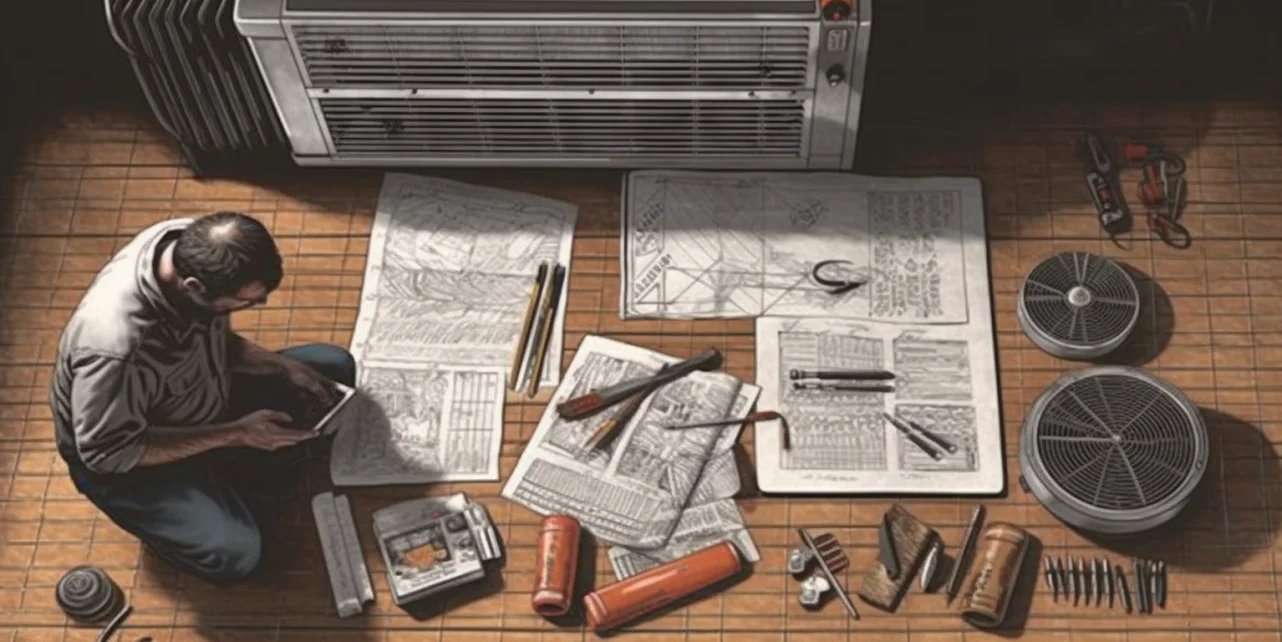Having your own HVAC tools list is without a doubt, essential for any HVAC technician. These tools are necessary for troubleshooting, installing, and repairing heating, ventilation, and air conditioning systems. Here are some of the must-have tools for any HVAC professional.
1) Multimeter – This tool is used to measure voltage, current, and resistance, and is essential for diagnosing electrical issues in HVAC equipment.
2) Screwdrivers – A set of different sized screwdrivers is necessary for any HVAC job, as they are used to tighten and loosen screws in various parts of the system.
3) Wrenches – Similar to screwdrivers, different types of wrenches such as adjustable and socket wrenches are needed for tightening and loosening different sizes of nuts and bolts.
4) Drill – A power drill is a handy tool for any HVAC technician. It can be used to create holes for piping and wiring, as well as for securing components in place.
5) Leak detection tools – These include refrigerant leak detectors and pressure testing gauges, which are used to find and fix leaks in the HVAC system.
6) Pipe cutters – These tools are essential for cutting and shaping pipes used in HVAC systems.
7) Tape measure – HVAC technicians need to measure various components of the system for installation and repairs, making a tape measure an essential tool.
8) Manifold gauge set – This tool is used to measure refrigerant levels and check the pressure in HVAC systems.
9) HVAC vacuum pump – When installing or repairing HVAC systems, it is necessary to evacuate any air or moisture from the system, and a vacuum pump is needed for this process.
10) Electrical testers – These tools are used to check for electrical current and to ensure that wires are properly connected.
Having these tools readily available can save HVAC professionals time and effort, as well as ensure that any job is completed efficiently and accurately. It is important to regularly maintain and upgrade these tools to ensure that they are in good working condition, as they are a crucial part of any HVAC technician’s job.
Benefits of Having a Comprehensive HVAC Tools List
Having a comprehensive HVAC tools list provides numerous benefits for any HVAC technician. This also leads to increased efficiency and productivity, as technicians can focus on completing the job at hand without interruptions.
A well-stocked HVAC tools list also allows technicians to handle a wide range of tasks, from basic repairs to more complex installations. This versatility gives technicians the confidence to take on any job, knowing they have the necessary tools to do so.
Furthermore, having a comprehensive list of HVAC tools can improve the quality of work. With the right tools at their disposal, technicians can ensure precise and accurate work, resulting in better functioning HVAC systems and satisfied customers.
Another benefit of a comprehensive HVAC tools list is cost savings. By owning their own tools, technicians can avoid the cost of renting or borrowing tools, which can add up over time. Additionally, technicians can also save money by avoiding unnecessary purchases of tools they already own but may have forgotten on a particular job site.
Lastly, having a comprehensive list of tools promotes safety in the workplace. HVAC systems can be dangerous to work with, and having the right tools ensures that technicians can perform tasks safely and effectively. By regularly maintaining and updating their tools, technicians can minimize the risk of accidents and injuries on the job.
Must-Have Tools for Any HVAC Technician
HVAC tools are necessary for any technician working in the heating, ventilation, and air conditioning field. Here are some of the essential tools that every HVAC professional should have in their toolbox.
Additionally, a manifold gauge set is essential for measuring refrigerant levels and pressure, while a vacuum pump is necessary for evacuating air and moisture from the system. Electrical testers are another critical tool for checking for electrical current and ensuring proper wire connections. Having a comprehensive HVAC tools list provides numerous benefits for technicians.
Upgrading and Maintaining Your HVAC Tools List for Efficiency
This will not only increase the lifespan of your tools but also improve the efficiency of your work.
One way to maintain your HVAC tools is by regularly cleaning and lubricating them. This will prevent rust and buildup, ensuring that your tools continue to work smoothly. You should also inspect your tools for any signs of wear and tear and replace them if necessary.
Additionally, it is important to regularly upgrade your tools to keep up with the latest advancements in technology. Investing in newer, more efficient tools can save time and improve the quality of your work. For example, upgrading to a digital multimeter can provide more accurate readings and speed up troubleshooting processes.
Another way to upgrade your HVAC tools list is to consider investing in cordless and battery-powered tools. These can provide more flexibility and ease of use, particularly in tight or hard-to-reach spaces.
In addition to upgrading your tools, it is also important to regularly review and adjust your HVAC tools list. As your skills and job responsibilities evolve, your tool needs may change. Make sure to add or remove tools from your list accordingly to ensure that you have the necessary tools for any job.
The Role of Electrical Testers in a Proper HVAC Tools List
Firstly, electrical testers are necessary for ensuring the safety of both the technician and the customer. This is especially important during troubleshooting and repair work.
In addition, electrical testers are crucial for identifying faulty wires and connections in HVAC systems. This can save time and money by avoiding potential system breakdowns or malfunctions.
Electrical testers are also important for maintaining the efficiency and performance of HVAC systems. A faulty electrical connection can lead to increased energy usage and decreased performance of the system.
Finally, including electrical testers in an HVAC tools list can also benefit the reputation of the technician or company.
Investing in Quality HVAC Tools: Why It Matters for Technicians and Clients
Investing in quality HVAC tools is not only important for technicians but also for clients. Here are some reasons why it is worth the extra money to purchase high-quality tools.
For technicians, investing in quality tools can save time and effort. In addition, these tools often come with warranties and reliable customer support, providing peace of mind for technicians.
Investing in quality tools can also lead to better work performance. For clients, the use of high-quality tools can also lead to a job well done and a functional HVAC system.
Moreover, investing in quality tools can also lead to cost savings for clients. By using efficient and precise tools, technicians can complete jobs quickly and effectively, ultimately saving clients money on labor costs.
Lastly, investing in quality HVAC tools can lead to a safer work environment for both technicians and clients. Higher quality tools are designed with safety in mind and are less likely to malfunction or cause accidents.
Key Takeaways
In summary, having a comprehensive HVAC tools list is essential for any HVAC technician. It ensures that they have the necessary tools for any job, leads to increased efficiency and productivity, and can improve the quality and safety of their work. Regularly maintaining and upgrading these tools can further enhance their effectiveness. Electrical testers are a crucial tool for safety and functionality in HVAC systems and investing in quality tools can benefit both technicians and clients in terms of time, cost, and reputation. By having the right tools at their disposal, HVAC technicians can confidently take on any job and provide quality and efficient services to their clients.



